Key Highlights
- Ozempic (semaglutide) is made for people with type 2 diabetes. It helps to bring blood sugar levels down. It also helps with weight loss. The medicine can have side effects. Most side effects are about the stomach. In rare cases, it can cause major changes to vision. If vision loss happens because of ischemic optic neuropathy (NAION) when using Ozempic, you should get help from your doctor right away. NAION usually leads to damage that the doctor cannot fix, even if it is found quickly. A doctor can try to stop more vision problems, but most damage to sight will stay.
- Most side effects affect the stomach, but there are rare and serious risks that can hurt your eye health and might lead to vision loss.
- Groups that check medicine safety have found Ozempic may be linked to a very rare eye problem. It is called Non-Arteritic Anterior Ischemic Optic Neuropathy (NAION).
- A few studies say there might be a small increase in other eye issues, such as neovascular macular degeneration, in people who use this drug.
- If you take Ozempic, you need to watch your eye health closely. Tell your doctor right away about any fast or sudden eye changes, or about other changes in sight.
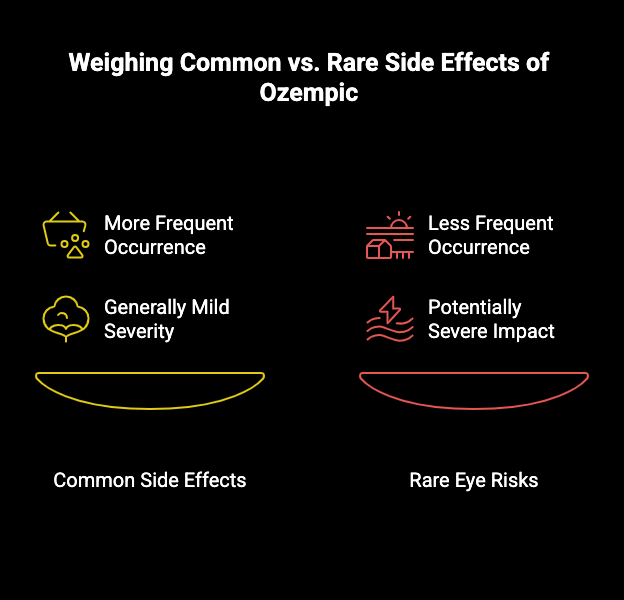
Introduction
Ozempic is now well known in the world for treating type 2 diabetes. Many people also talk about it for weight loss. As the use of Ozempic goes up, more people want to find out about what side effects it can have on the body. A lot of people already know about the common stomach side effects. But, not many people know that it might also affect your vision. This article will take a look at the link between Ozempic and your eyes. It will help you understand some side effects that are rare but very serious and that people should know.
Understanding Ozempic and Its Use in Diabetes Care
Ozempic is a medicine that has semaglutide as its key ingredient. It belongs to a group called GLP-1 receptor agonists. Doctors use it for the treatment of diabetes, especially for people with type 2 diabetes. It helps control blood glucose levels. Clinical trials show Ozempic works well to help control glucose levels. A lot of healthcare providers trust Ozempic for their patients’ blood glucose.
These days, weight loss drugs are in the spotlight. Many people are asking about them, not just those who have to manage diabetes. You may want to know how these weight loss drugs help people lose weight. It is helpful to see what the drug does in the body. It is also useful to learn the ways doctors use it for people. Here, we will look at how the drug works in you. We will also talk about how and when doctors decide to give it to people.
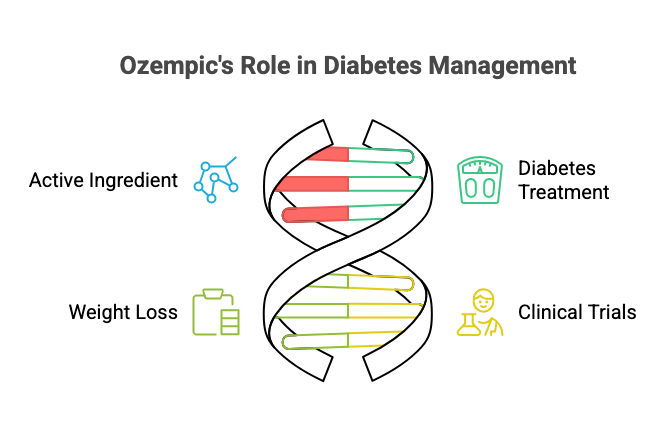
How Ozempic Works: Mechanism of Action
Ozempic acts like a hormone in your body called GLP-1. When you eat, your small intestine lets out GLP-1, and this helps your body handle blood sugar. Ozempic does the same thing as GLP-1. It starts the same work in your body. This tells your pancreas to make more insulin. The insulin helps lower your glucose levels after you eat.
The drug administration helps you keep blood glucose at a good level. It works by stopping glucagon from being released. Glucagon makes your liver create more sugar. With both these actions, the drug administration becomes a strong way to control blood glucose levels. This helps you keep glucose levels steady over time.
Ozempic helps with weight loss in more than one way. One big reason is that it changes your digestion and controls how hungry you feel. The medicine makes food stay in your stomach longer. You feel full for more time and want to eat less. This leads to lower food intake and helps people lose weight.
Approved Uses and Off-Label Prescribing Trends
The U.S. Food and Drug Administration (FDA) says that Ozempic is okay to use for some health needs. This medicine helps adults who have type 2 diabetes. It works to control blood sugar when people also eat healthy and get some exercise. The Food and Drug Administration also says Ozempic is good for lowering the chance of big heart problems, like heart attacks and strokes. It is used for adults who have type 2 diabetes and heart disease.
Novo Nordisk makes these medicines. Novo Nordisk also sells a medicine with more semaglutide. The name of that one is Wegovy. Wegovy is for people who want help with weight loss over time. The medicine is known to work well. A lot of people now use Ozempic for weight loss, even if they do not have diabetes. This is a new trend these days.
Taking any medicine for things not listed on its label should be done with care. Some people use weight loss drugs to help them lose weight. A doctor should guide you if you want to use these drugs. He or she will look out for side effects and check if the medicine is good for your health. People who do not have diabetes need a medical expert to watch over them while they take weight loss drugs. The right help makes it safer for you.
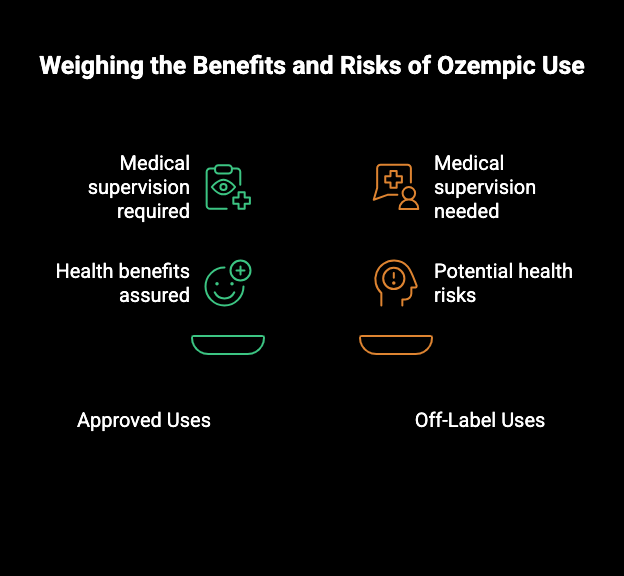
Overview of Ozempic’s Side Effect Profile
Like many other drugs, Ozempic can cause some side effects. These problems were found in clinical trials. The most common side effects usually show up in the stomach or gut. A lot of people get these side effects when they start using this medicine or if they take a bigger dose.
However, the side effects can be more than just small aches or issues. There are some serious problems too, and a few can damage your vision. While some are rare, they can still be harmful. It is important to know about both common and serious side effects. This way, you can use the medicine in a safe way.
Common Side Effects Observed in Clinical Trials
During clinical trials, the side effects that people felt were common. The drug can change how the digestive system works. It also makes food stay in the stomach longer. Many people feel these side effects more when they first start the treatment.
The most frequently observed side effects include:
- Nausea
- Vomiting
- Diarrhea
- Abdominal pain
- Constipation
Other side effects that people report are trouble with digestion, tiredness, and feeling dizzy. Some people who take GLP-1 agonists have stronger stomach problems. This can be something called stomach paralysis or gastroparesis. Ozempic can help you with weight loss and keep your blood sugar at a good level, but you should talk to your doctor about these side effects.
Serious Adverse Reactions to Watch For
Along with the usual stomach side effects, Ozempic also has some important warnings you should know about. There is a strong warning from the FDA in the prescription label. The warning tells you about the chance of getting a thyroid C-cell tumor, like medullary thyroid carcinoma. This risk was found in tests done on rodents. Right now, it is not clear if people can get this side effect or not.
People who get medullary thyroid carcinoma or have the cancer in their family should not use Ozempic. If you have the problem called Multiple Endocrine Neoplasia syndrome type 2, you also should not take this medicine. There are side effects and other big things to watch out for when you use Ozempic, too.
- Pancreatitis is when there is swelling in the pancreas.
- Changes in vision can happen. There is a risk of sudden loss of vision.
- There can be kidney problems. A person can have sudden kidney injury.
- There may be serious allergic reactions.
The medicine is given to help lower the risks that come with cardiovascular disease for some people. It is important for you to watch for any new symptoms or if older ones get worse. Be sure to talk to your healthcare provider about these.
Exploring Eye-Related Risks Associated with Ozempic
Lately, there is talk about eye issues that may come from using Ozempic and drugs like it. These eye problems do not happen to most people. But they can be very serious when they do. This is why it is good to learn more about them. Some new reports and studies show how these drugs could be linked to changes in your vision.
These worries are about the chance that old eye problems, like diabetic retinopathy, can get worse. There can also be new and strange problems that show up. A big problem right now is something called ischemic optic neuropathy. This can make you have sudden vision loss. The next parts will talk more about these risks, like vision loss, ischemic optic neuropathy, and diabetic retinopathy.
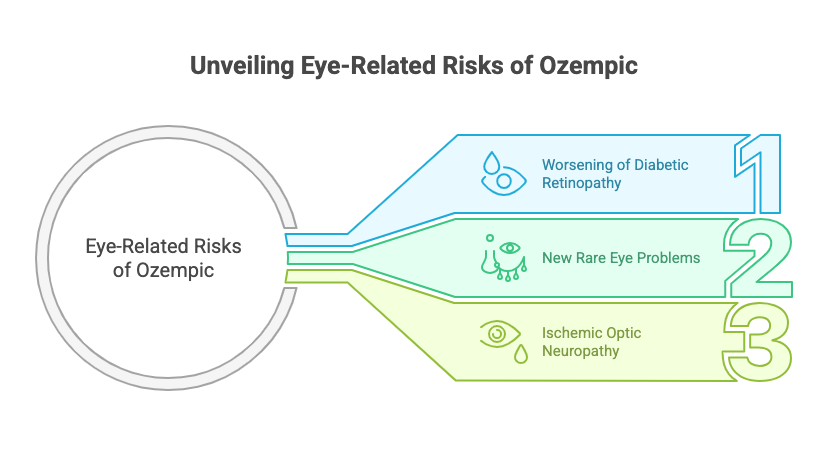
Incidence of Vision Changes During Ozempic Therapy
Most people who use Ozempic do not get eye problems. But now, research shows there might be a small rise in the chance of vision loss. A study found that those who use GLP-1 agonists like Ozempic have a little higher risk of getting neovascular age-related macular degeneration. This problem in the eyes can cause vision loss.
The study found that there is a small difference in how often nAMD happens after one year. This difference is real. The list below shows these numbers:
|
Group |
Incidence of nAMD after 1 Year |
|---|---|
|
GLP-1 Receptor Agonist Users |
0.2% |
|
Non-Users (Control Group) |
0.1% |
This means that out of 1,000 people who take these drugs, there may be one more case of nAMD than in people who do not take the drugs. Ozempic helps lower blood sugar fast in people who already have diabetic retinopathy. Sometimes, when blood sugar drops quickly, it can cause diabetic retinopathy to get worse for a short time. If you notice any change in your vision, feel blurred vision, or have sudden loss of vision, you should talk to your doctor right away.
How Often Do Eye Side Effects Occur?
Serious eye issues from Ozempic are very uncommon. The European Medicines Agency (EMA) has said that NAION will be called a “very rare” side effect when taking semaglutide. This means less than one in ten thousand people may get this eye issue.
However, you need to think about the risk for each person. People who have type 2 diabetes are at high risk for several eye problems. This is because high blood sugar can damage the blood vessels in the eyes. Because of this, these people might get side effects in their eyes from medications that change blood sugar levels.
Data from the big clinical trials and from real-world studies are still being looked at. The goal is to see how often people get these eye issues. The main thing to know is this. Even if the risk is not high, these eye issues can become very serious. That is why it is important for people who take the drug to know about the risk. It is also important to have careful check-ups.
NAION Explained: The Rare Eye Condition Linked to Ozempic
One of the main, but not very common, eye problems linked to semaglutide is called Non-Arteritic Anterior Ischemic Optic Neuropathy (NAION). This problem causes harm to the optic nerve. The optic nerve helps send what you see from your eye to your brain. Doctors know this problem as ischemic optic neuropathy.
NAION is a kind of ischemic optic neuropathy. This happens when there is damage to the eye nerve from not enough blood flow. Global health organizations now say that NAION is a very rare side effect of semaglutide, which you can find in Ozempic. It is important for people who use this drug to know what ischemic optic neuropathy is and what the drug might do to their eyes. You should also learn what evidence connects this very rare side effect of semaglutide to the drug.
What is Non-Arteritic Anterior Ischemic Optic Neuropathy (NAION)?
Non-Arteritic Anterior Ischemic Optic Neuropathy (NAION) is a problem where you can lose vision in one eye all of a sudden. You do not feel pain, but you still lose sight right away. This problem happens when there is less blood flow to the front part of the optic nerve. If the optic nerve does not get enough oxygen and food from the blood, it gets hurt. The nerve fibers are not able to send signals to the brain like they should. This is what leads to this kind of vision loss called ischemic optic neuropathy.
The word “non-arteritic” means this kind of ischemic optic neuropathy does not come from swollen arteries. The other kind happens if the arteries get inflamed. NAION is the more common type. It often shows up with other health issues. Some of these are diabetes, high blood pressure, cholesterol problems, and blood pressure issues. Many of the same health issues are treated with Ozempic.
This link to the blood vessel risk factors is very important when we try to understand how it is connected to some medications. Out of all the eye diseases that can make a person lose their sight, NAION is different. It is worrying because it can happen without warning and may cause lasting loss of vision.
Scientific Evidence Connecting Ozempic to NAION
There are more case reports and safety checks showing that there might be a link between semaglutide and NAION. The clinical trials done at first did not find this risk. But after the medicine came out, some cases began to show up. Because of this, groups that set health rules have stepped in.
In June 2025, the safety team at the European Medicines Agency said there should be a note in the product information for semaglutide. It should say that NAION is a very rare side effect. At the same time, the World Health Organization said the plan for handling risks with semaglutide needs an update. NAION should be listed as something that could happen.
The exact way this link works is not fully clear yet. Some people think the drug can change blood flow or do something to the blood vessels. There are only a few cases where this has happened. Even so, health officials now say there may be a link. This shows how important it is for people to know about it.
Practical Guidance for Ozempic Users
If you use Ozempic, make sure you check in often with your health care provider. Be aware of how you feel. You should watch your vision and tell your health care provider if you see any changes. Drug administration can work well, but it can also bring new or strange symptoms. Keep in touch with your health care provider if there is anything that does not feel right.
Taking care of your health is not only about watching your blood sugar. You need to notice how you feel each day and know, when needed, to ask for help. These simple steps can help you stay safe as you use this medication.
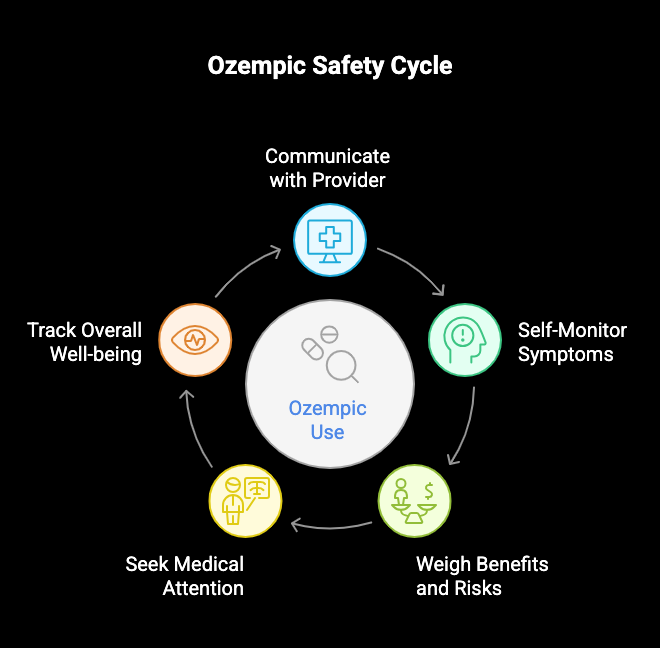
Warning Signs: When to Seek Immediate Medical Attention
It is important for people who take Ozempic to know what warning signs to look out for. Some symptoms may be very serious and you should get help from the doctor fast to stop things from getting worse. If you notice any quick change to your eyesight, don’t wait until your is next visit. Make sure to go see your doctor right away.
Contact your doctor or go to the emergency room right away if you see any of these:
- A sudden loss of vision or blurry eyesight can happen in one eye or both eyes.
- You might start seeing floating spots or flashes of light when you look around.
- A very strong pain in your stomach can show up, and this pain can move to your back.
- You may feel signs that your blood sugar is very low. This includes things like confusion, feeling dizzy, or shaking.
- There can be signs of kidney problems, such as changes in how much you pee or swelling in your legs.
- Watch out for signs of a serious allergic reaction, like swelling in your face, lips, or throat, and having trouble with breathing.
Acting fast is important. When you take care of eye issues and other big signs early, it can help your health over time. This can make a good difference for you in the long run.
Tips for Monitoring and Protecting Your Eye Health
Keeping your eyes healthy while you take Ozempic is very important. You need to know about the medicine and take care of your eyes. Diabetes can cause eye problems, so you want to focus on eye care. These steps are important for everyone who has this condition.
Start by making small changes before any problems come up. Here are some tips to help you look after your eye health and keep your eyes safe:
- Schedule Regular Eye Exams: Go to see your eye doctor every year. If your doctor says you need more checkups, follow that advice. A full eye exam can find problems early, sometimes before you feel or see anything is wrong.
- Maintain a Healthy Lifestyle: Eat a healthy diet that has things like leafy greens, fish, and nuts. These help your eyes get the nutrients they need. Regular exercise is good for your blood flow and helps every part of your body, even your eyes.
- Protect Your Eyes from UV Rays: Always wear sunglasses when you go out. Make sure the sunglasses block 100% of UVA and UVB rays.
- Discuss Your Family History: Talk to your eye doctor about your family history. If there are people in your family with an eye disease, it can make you more likely to have eye problems too.
- Manage Your Blood Pressure: Keep your blood pressure and cholesterol at healthy levels. High blood pressure or too much cholesterol can hurt the blood vessels in your eyes.
If you wear contact lenses, you need to keep them clean. This helps to stop eye infections. Good hygiene is key to your eye health.
Eye Health Perspectives from Medical Experts
Ophthalmologists are medical doctors. They work to help the eye. They look at medicines like Ozempic while thinking about all of the patient’s health. The doctors know that Ozempic is good for people with diabetes. It can help stop or slow diabetic retinopathy and other eye diseases as people get older.
Eye specialists say that people should be careful and look out for any changes. They say if you start Ozempic and have eye problems already, you need to stay in touch with your health care provider and your eye doctor. This way, any issues can be found early and taken care of.
What Ophthalmologists Recommend for Patients on Ozempic
From the eye doctor’s view, the best way to use Ozempic with less problems is to stay active. You should work together with your main doctor and your eye doctor. You, your doctors, and the whole team need to keep talking with each other. This will help care for both your body and your eyes.
Here are some tips for people who take Ozempic, based on what eye doctors say:
- Establish a Baseline: Get a full eye exam done before you start Ozempic, or soon after. Your eye doctor will then know what your eye health is like from the start.
- Maintain Regular Checkups: Keep going for your yearly checkups with your eye doctor. If you have a family history of eye disease or other eye problems, you may need to go more often. Go as your eye doctor says, so your eyes can stay healthy.
- Prioritize Blood Sugar Control: Ozempic can help, but you should still watch your blood sugar. Use good food choices, regular exercise, and your medicine every day. This could stop diabetic eye disease from starting or getting worse.
- Report Symptoms Immediately: Tell your eye doctor right away if you notice any new changes in your vision, like blurry vision, floaters, or blind spots. Do not wait to say something.
- Wear UV Protection: Wear sunglasses every day, even on cloudy days. This lowers the chance of cataracts and other damage from the sun.
These steps can help you look after your eye health, take control of your blood sugar, and get help from your eye doctor when things change. Be extra careful if there is a family history of eye problems, and remember, sunlight can harm eyes even on cloudy days.
These steps can help you get good results from your diabetes treatment. At the same time, you can lower the risks to your eyesight.
Conclusion
To sum up, you need to know about the side effects of Ozempic. Some of these can affect your eye health. If you take Ozempic, there may be rare side effects like ischemic optic neuropathy. This is why it is good to watch for any changes in your eyesight. Always listen to your healthcare provider and do what they say. This can help lower any risks from the medication. If you feel anything strange or notice something odd with your eyes, get help from a doctor right away. Your eye health is very important. Stay up-to-date and look after yourself. For the best advice, talk to your healthcare provider.
Frequently Asked Questions
Is Ozempic safe for people using it for weight loss?
When you use Ozempic for weight loss, you can get the same side effects as people who use it for diabetes. You need a health care provider to watch over you at this time. A health care provider checks your blood sugar and helps look after your health. If you get side effects or feel any issues, they can help. It’s good to have someone there for you to manage side effects and make sure your health is safe.
Can NAION be reversed if detected early?
The damage to the optic nerve from NAION often causes vision loss that does not improve over time. It is very important to find this problem early. Early detection can help you take steps to protect the other eye. But most times, the loss of vision in one eye cannot be fixed.
Where to find reliable information on Ozempic’s eye-related side effects?
For details about side effects, talk to your health care provider or your pharmacist. You may read the information from Novo Nordisk to know more. If you need other facts on medicinal products, you may visit the FDA website or trusted groups online. This is a good way to be sure the facts you get are correct.
References: [1] European Medicines Agency. (2025, June 6). PRAC says that NAION, which is an eye problem, is a very rare side effect of semaglutide medicines Ozempic, Rybelsus and Wegovy. You can read more at https://www.ema.europa.eu/en/news/prac-concludes-eye-condition-naion-very-rare-side-effect-semaglutide-medicines-ozempic-rybelsus-wegovy
[2] Shor, R., et al. (2025, June 5). Glucagon-Like Peptide-1 Receptor Agonists and the risk of macular degeneration. You can read this in JAMA Ophthalmology at https://jamanetwork.com/journals/jamaophthalmology/fullarticle/2819894


